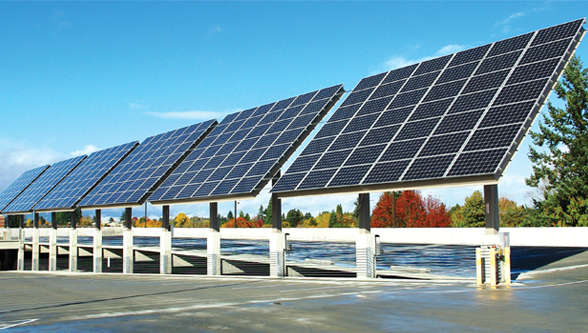Since the industrial revolution, factories have been among the world’s biggest consumers of energy due to the mass scale and high volume of processes centralized in one location. Here’s an insight into how rooftop solar energy can be used by manufacturing industry to reduce their operating costs
Article by Rahul Dasari
With the ‘Make in India’ program creating a lot of waves, the manufacturing industry can easily be touted as one of the most profitable sectors in India. While the foothold of this industry is quite strong already, it is truly the potential that looks quite uphill as well.
As per the India Brand Equity Foundation, it is reported that the investments in this industry (both foreign and domestic) have seen a rise of 10% between FY 16 and FY 18 alone. But here is the real challenge.
The resources in the country are not sufficient or even affordable for many manufacturers. Usual electricity cuts and the costs of substitute non-renewable electricity can cut deep holes in pockets of manufacturers. There is no denying that a solution for a growing industry that ensures more sustainability is ideally the way to go for a sector like this. To that effect, here is an insight into how rooftop solar energy can serve as a future beneficial source for the manufacturing world:
Manufacturers embracing solar energy: Current scenario
Since the industrial revolution, factories have been among the world’s biggest consumers of energy due to the mass scale and high volume of processes centralized in one location. Factories call for high energy intensive processes.
To name a few, manufacturing, assembling, repairing and processing which is supported by very high energy consumption devices like motors, compressors and chillers. As a result, multiple manufacturing companies are adapting to on-site solar power as the perfect way to reduce their operating costs.
Factories are known for having large commercially unutilized roofs which is an ideal installation site for solar panels. Not only factory roofs, but the parking lots and other carports can also be used to install solar system.
For example, if manufacturing unit has 1 Lakh sq. ft. commercially unutilized roof space, it can accommodate 1 MWp capacity solar power plant costs around INR 4 Cr. customer can avail INR 1 Cr of tax benefit from the government.
Therefore, the effective capital investment in solar power plant installation would be INR 3 Cr. 1 MWp rooftop solar power plant generates 14-15 Lakh units of electricity annually. Considering 7-8 rupees / unit Discom tariff, customer can yield INR 1.1 to 1.2 Cr worth of electricity every year. So, the investment payback period would be of 2.5 to 3 years.
Life of solar power plant is a minimum of 25 years and with Discom tariff escalations the savings are only going to increase year on year. Ultimately ‘Every penny saved is penny earned. Recently, the world’s leading Swiss textile machinery manufacturing brand Rieter; has taken a step towards sustainability at their manufacturing unit located near Pune, Maharashtra with the installation of 2 MWp capacity rooftop solar power plant. This power plant is expected to generate around 29 Lakh units of electricity annually and will contribute to the environment by reducing 2500 Tons of CO2 every year.
Why choose solar power energy for the manufacturing industry Here are some of the important reasons for manufacturing companies to embrace rooftop solar power.
• Utilization of unused space: Companies can use commercially unutilized vacant roofs to generate electricity at the lower tariff with a payback between 2.5 – 3.5 years depending upon tariff of the Distribution Company.
• Accelerated depreciation tax benefit: Today, according to central government policies, investment (Capex) in solar power plants is eligible for an Accelerated Tax Depreciation of 60%. This implies that you can allow 60% of the total project cost as depreciation in the first year, and 40% of the remaining project cost in the subsequent years.
• Hassle-free maintenance: The solar plant comprises of no complex mechanical arrangements and moving parts thus, requires minimal maintenance. The routine maintenance of solar plant includes regular cleaning of the PV modules over a 10 -15 days’ time and monthly checkups of inverters and PV modules. The solar inverters and PV modules come with is 5 and 25 years of warranty respectively.
• Zero Investment Plans (Opex): With Zero Investment option, companies can sign Power Purchase Agreement (PPA – Contract) with an investor who can offer less expensive energy at zero upfront cost. This eliminates Capex investment in solar energy.
• Modularity: Rooftop solar PV system designs can be highly customized. System sizes can be specifically tailored to meet company’s energy, space and budget requirements.
• Reduced dependency on diesel backup: Most factories depend heavily on diesel generators to ensure continuous power. Solar power can reduce the dependence on diesel power; if not eliminate the need for it. Solar power comes at a levelized cost of around a quarter of diesel power. Hence it makes more sense to depend on solar power, subject to the time of usage.

The author of the article is Rahul Dasari.
He is the Chief Executive Officer of Sunshot Technologies. He has over 11 years’ experience in the Indian cleantech industry and is an executive committee member of Distributed Solar Power Association (DiSPA).
Share feedback and join the discussion on the Telegram Group
https://t.me/joinchat/




